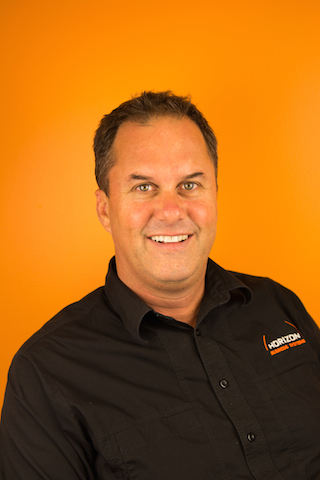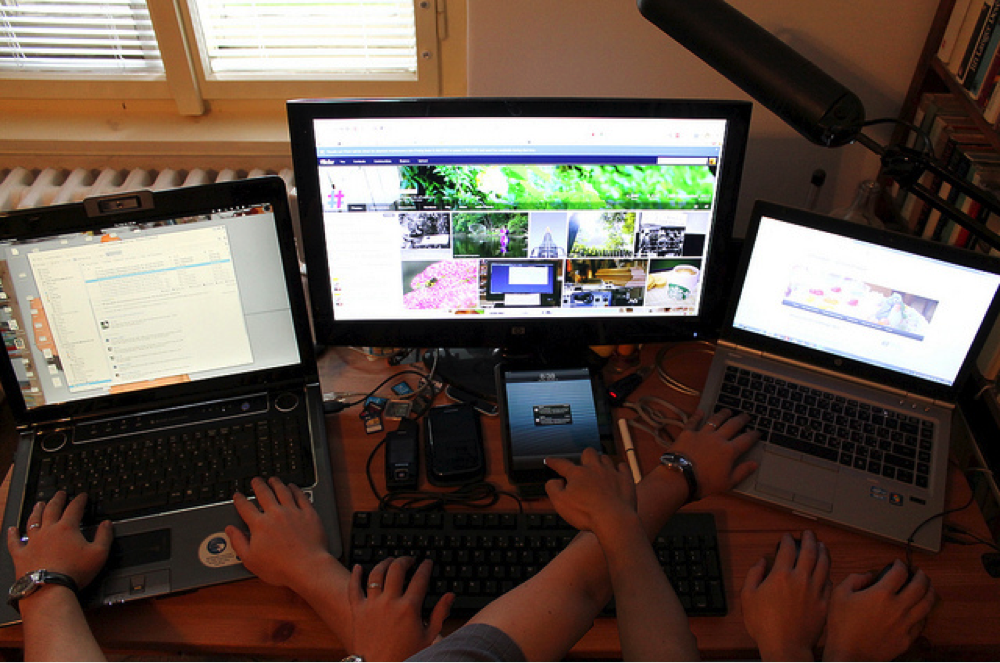
This month on the blog we sat down for a Q&A with our CEO Michael Pendred to find out more about the history of Horizon Business Systems; get an insight into Michael’s vision for helping other businesses achieve, and how Horizon is doing so.

Michael Pendred
Managing Director
I’m interested in how things work, how things are built, new ideas and hearing about the very cool things that our clients do. I think that I’d be bored if all I dealt with was my own business, so having Horizon allows me to step into lots of different businesses and see how they work. I find the complexities in how companies manage their jobbing or other business/management processes intriguing and I’m always looking for better ways of doing things – I know that I should get out more!
I also wanted a business where we really felt like a team. I’m lucky enough that the crew that Jon and I have brought together at Horizon are people that we really like and we enjoy working with them. All the personalities are different, all of their skills and the experiences that they bring to us are amazing, and they all believe in our vision of ‘helping businesses achieve’. I’ve always felt that it’s an insular view to just want your own business to be successful – if you aren’t contributing to the business community, the local economy and to the success of other businesses, you can’t stay successful for long.
I have a degree in Financial Management and Economics but have had the opportunity to work across different industries with sales and management roles in the Financial, Hospitality, Tourism, Health and IT industries across the world over the past 25 years.
A lot of the time our clients have experienced growth and added on to the systems that they were using when they first started up – e.g. piggy-backing disparate systems, double handling of tasks etc. – so they are really looking to simplify things for themselves.
It seems really straightforward, but having a system like MYOB EXO makes life easier for everyone from the Receptionist to the CEO. This can include no longer having things (like customers or orders!) ‘slip through the cracks’, tasks can be completed more accurately and efficiently, and provide employees and management an overall view to manage all the critical processes in their business and ultimately make better decisions going forward.
I believe that one of our team’s most important skills is that we don’t walk into a business with the idea that we already KNOW how they work. We want our clients to tell us what works for them and what they need – then we go out of our way to value add to this.
Each client that we work with, even those that provide similar services or products, do certain things uniquely. Of course we want them to be compliant – just to limit that particular pain! – but we also understand that the companies that are our clients have built themselves from small businesses into successful companies, so they’ve done a lot of things right to get themselves to this point. These are businesses that just need our input to streamline things and help them get to the next level.
Every client relationship that we build also adds to our own skill set as we learn something new from each business. A lot of consultancy businesses out there will go into companies with the view that they will just replicate what they did last week at another business, rather than take the time to understand and respect the way that you do business. We genuinely feel invested in each of our clients – most likely because we are a local business too.
I try to think of myself as a person who has not led a sheltered life but I may have blushed (or asked for clarification!) once or twice when we were building customised reporting dashboards for Adult Shop!
In the short term, it’s seeing the change in companies once we are able to help them make once painful processes in businesses pleasant.
In the longer term, several of our clients were just taking the leap from a small to mid-sized business a decade ago when Horizon began and we have enjoyed seeing them grow and become even more successful. One of my pastimes is ‘client spotting’; where I’m driving somewhere with my family and I point at a business, sign or company badged car and go ‘there’s one of our clients!’ – it used to be a rare spot but, after a decade in Western Australia, it’s a lot more common now.
We have won MYOB’s Partner of the Year a few times but I truly think that last year’s MYOB Excellence in Customer Satisfaction (Australia) award was the most satisfying. It’s a real team effort and is the best measure of our client focus and success.
The development teams behind MYOB EXO and MYOB Advanced are amazing. We are fortunate that MYOB is an established product provider than can and does prioritise continual development for its ERP business management software offerings. Because MYOB’s EXO and MYOB Advanced ERP products are geared towards mid-sized businesses, rather than monolithic business entities/large scale government bodies (where processes are carved in stone and changes don’t occur at speed or with any regularity), MYOB and its products are open to, and usually leading, ERP development.
As Platinum Partners with MYOB, the team at Horizon are ‘at the coal face’ in our day to day dealings with the companies that use the products, so we make it a priority to have an open and continual dialogue with MYOB about our clients’ needs and projected requirements for the future.
Cloud solutions have been emerging over the last few years and these will gain a larger market footprint as time goes on. Mobile add-ons in time capture, service management and reporting will become the norm. Also, the tools and customisation that once only the big businesses could afford, are filtering down to being more manageable, mobile and cost effective adaptations for mid-sized businesses.


As a business owner, there will come a time when you need to decide whether or not it’s worth it to replace a particular tool or piece of machinery. Timing your replacements is critically important. You want to get as much value as possible out of your equipment, but you don’t want to allow old or worn machinery to have a negative impact on your business.
As you carry out a cost/benefit analysis of your equipment upgrade investment, consider these points and our pro tips on how your business management software can make it easier.
When your machinery and tools break down or need maintenance, it can cause backups and delays in production. Other tools can end up being overused to compensate, which can cause them to wear out more quickly.
Weighing up the cost of maintenance with the cost of new machinery is not enough – you also need to take into account the opportunity cost associated with outages. Check your ERP software (e.g. the MYOB Exo Job Costing Module) to can get an insight into the average revenue/profit you make per job. If the combination of missed revenue opportunities from outages combined with foreseeable maintenance costs is starting to cost you more in the long run then it’s time to make the investment in upgrading your equipment.
Business experts often consider cashflow one of the biggest struggles for small business owners. Knowing when to replace a tool is a question not just of when the tool has ceased to be effective, it is also a question of when the business can afford to replace it. If a tool breaks down at the beginning of the tightest cash-flow season, there may be no solution but to limp along until cash is available again.
Purchasing at the wrong time can cause your business not to have the available cash you need to buy inventory, make marketing changes, or even to pay employees.
Your accounting and finance software is an invaluable asset for cashflow planning. Use it to get an insight to predict when you’ll have the available cash to make a big purchase. Sometimes it can make sense to replace a tool that is still technically functional, if the timing of the purchase is right.
The 2015 Australian Budget contained a great benefit for businesses that need to replace aging machinery: an instant tax deduction for assets that cost up to $20,000. The instant deduction is only available for qualifying businesses, so make sure to read up on the deduction or speak to a professional accountant. But for businesses who turn-over less than $2,000,000 annually, an instant deduction may be a better deal tax-wise than depreciating equipment over the expected life of the machine.
If you’ve previously depreciated your assets, or if your business doesn’t qualify for the instant deduction, again your ERP functionality can help. The MYOB Exo Fixed Assets Module can help you get insight into how your taxes will be affected.

There are hundreds of different types of business management software applications on the market, and it can be difficult to determine which is right for your particular business. These software programs can be divided into two main categories: 1) dedicated standalone software (software with a single purpose like accounting or CRM etc.); and 2) single integrated business management software (aka ERP software, which integrates all of, or the majority of, the functions covered by various standalone software solutions).
Here we will discuss the benefits and drawbacks of each option and how they can be applied to your business.

The struggle of multiple standalone software packages. Image Credit
Dedicated standalone software applications are those that are designed to address a specific single aspect of business operations, such as accounting, human resources, customer relationship management (CRM) etc. Each application is dedicated to just one area of your business, so it delivers focused, highly detailed reports about that segment. A variety of specific functions allow you to manipulate the data as needed to obtain the information you are looking for. Because these programs focus on a specific department, it is easy to find the data you need without having to sift through information from other areas or struggle with reports that don’t tell you exactly what you need to know. Standalone software often offers more in depth reporting capabilities and advanced functions than you would find in an integrated ERP solution.
However, standalone software programs do have their drawbacks. They are designed to be used on their own and often do not integrate well with other standalone software products. This can make it difficult to compare and correlate data across different departments (for example comparing invoicing to accounts paid, or checking the status of orders against client communication in the CRM), as you may need to export data to another software program or to Excel to manipulate and align data from various sources yourself. Not only is this time consuming but it also leaves a wide-open gap for human error.
With a single business management solution, the data for all of the departments within your business is all stored in one program. The different integrated aspects, add-ons and plugins of the program are all designed to work together seamlessly, so it is easy to generate reports and comparisons that encompass the entire workings of your organisation. The data in the reports is automatically generated in a way that is easy to understand and gives a full overview of the state of the business at a particular point in time or over a specified time period. Employees from various departments can access information from other departments without the need for complicated conversions and data manipulation.
The main drawback of using a single business management solution is that the reporting and functionality in each area of the software does not go into as much detail as with a standalone software program. However, it’s equally important to note that the functions and reporting features offered in integrated software generally tend to be satisfactory to meet the day-to-day needs of the majority of businesses, and those advanced functions found in standalone software would likely go unused for most if not all of the year.
For a business with a heavy focus on a specific area, like sales or finance, a dedicated standalone software application will provide the detail necessary for that specific department. On the other hand, a business with a more general outlook will appreciate the simplicity and ease of use that a single business management solution provides. The majority of businesses fall into this second category, so single business management solutions offer them the functions and reports they need without weighing them down with too many extraneous functions.
At Horizon Business Systems we offer MYOB Exo and MYOB Advanced software, which is one of the leading integrated business management solutions used by Australian companies. MYOB can incorporate many functions, including finance, payroll, customer relationship management, point of sale, job costing and many others. We can also custom develop additional add-ons for MYOB Exo to integrate any other departments or functions required by your business that are not covered in the current software range. Get in touch with us today to find out more.

As your business grows and you find the need to take on more employees to help you keep up, one of the most important skills you need to learn is ensuring you are making the correct payroll payments and remaining in compliance with the requirements of Australian Revenue Offices. One of the best ways to do this is to get a good accounting software program (like MYOB EXO with the EXO Payroll module). With the help of your accounting system, and these tips below you’ll be able to keep your employees and the ATO happy!
Payroll tax is a state based tax that is calculated on the wages you pay to your employees. If you expect your payroll to be higher than $550,000 annually, you will need to check registration requirements for your state. Your company should be familiar with Australian payroll requirements.
Pay can be done weekly, fortnightly or monthly. You will calculate your employee wages and deductions. Once that is completed you can issue payroll checks.
Payroll uses a pay-as-you-go income tax system, which allows you to withhold taxes from your employees. Australia has a progressive tax rate that is based on income and hours worked. Different states and territories have different rates.
When your employee payments exceed the threshold for your state or territory your business is required to pay payroll taxes for salaries, wages, commissions, bonuses and allowances. Each state and territory have their own thresholds and tax rates.
A variety of industrial regulations are established by the Australian Fair Work Act, which address the maximum number of hours an employee can work, working conditions, flexible working arrangements, vacation time, parental leave and more.
As an employer in Australia, all states and territories require you to carry workers compensation insurance for your employees. The premiums paid are based on a number of factors such as remuneration, industry type and claims history.
This is Australia’s retirement and pension program, and as an employer you are required to contribute a fixed 9 percent of your employee wages.
The provision of certain non-cash benefits, such as private health insurance or a company car, require your company to pay fringe benefit taxes. You must report on your PAYG payment summary any benefit that has a value of $2,000 or more.

As we approach the end of 2015 our attention turns to rewarding our staff to show them that their hard work and dedication has been noticed and appreciated.
There are a variety of ways that employers can reward staff Christmas parties, bonuses, gifts and leave. These are great ways of boosting the morale of staff but they can be a headache when it comes to entering them into your accounting software system as you try to work out what is tax deductible and what isn’t.
A Christmas bonus is morale boosting for employees – especially if it is linked to their work performance over the year.
Of course you’ll need to check the books to make sure the bonus structure doesn’t break the bank, as it is important that the yearly bonus system you choose to adopt is fair to your employees and covers you and your business if you go through a challenging period. Choosing a fair system that rewards the most hardworking members of your workforce will help you to keep your best members of staff motivated and encourage them to stay at your company.
When your staff have been working hard for you all year it can be nice to reward them with an office Christmas party. It allows staff to socialise, let their hair down and can be very morale boosting.
An important consideration, however, is that in the past the office Christmas party was tax deductible, but it no longer covers food, drink and entertainment.
You will find yourself having to pay Entertainment Fringe Benefits Tax if the cost per person is greater than $300 for the office Christmas party, so keep this in mind when setting the bar tab or choosing the venue/restaurant.
While employee entertainment in no longer tax-deducible, non-entertainment gifts up to the value of $300 per employee are still fully tax deductible and won’t incur Fringe Benefit Tax, so gifts are becoming an increasingly popular way to treat staff at Christmas.
Popular non-entertainment gift options include multi-store gift cards and Christmas food hampers. Staff love these kinds of useful gifts and the bonus for you is they fall under the $300 exemption from Entertainment Fringe Benefits tax.
As the New Year approaches it’s important to keep track of your employees’ annual leave accrual and keep on top of each situation. You must allow employees to carry over their accrued annual leave to the next year, but there are two situations in which you can direct employees to take annual leave:
Keeping on top of excess leave is important in order to mitigate the risk that employees with excess leave will resign, leaving you having to pay out a large sum of accrued leave pay.
A good business management and accounting system like MYOB Exo allows you to integrate accounting and payroll functions to make this task much simpler.